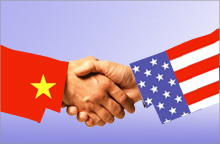 It was a strange sight at the National War College in Washington D.C. last week: A Vietnamese military officer giving a speech about his country’s national defense. Lieutenant-General Vo Tien Trung, the first member of the Vietnamese military to speak in the United States since the end of the war between the two countries in 1975, touched on myriad topics stressing Vietnam’s independence from entangling military alliances and emphasizing the important role which diplomacy plays as a mechanism for resolving current disputes.
It was a strange sight at the National War College in Washington D.C. last week: A Vietnamese military officer giving a speech about his country’s national defense. Lieutenant-General Vo Tien Trung, the first member of the Vietnamese military to speak in the United States since the end of the war between the two countries in 1975, touched on myriad topics stressing Vietnam’s independence from entangling military alliances and emphasizing the important role which diplomacy plays as a mechanism for resolving current disputes.
Trung’s speech comes on the heels of an agreement signed between the U.S. and Vietnam in September, which was widely seen by observers as giving Hanoi an added measure of security regarding its ongoing territorial spat with China over the Spratly Islands. While dialogue and negotiation are naturally the preferred methods with which to resolve the dispute in the South China Sea, a realist interpretation of the issue suggests that each country involved in the row have the military means to back up its rhetoric. Thus, the memorandum of understanding which Hanoi was able to ink with Washington is of vital importance to the Vietnamese government.
Diplomatic relations between the U.S. and Vietnam were only reestablished in 1995; both states held a mutual distrust of the other throughout the two decades following the deadly and drawn out war waged from 1955-1975 which resulted in the fall of Saigon to communist elements and the ultimate retreat of the American military.
Lt. Gen. Trung coolly dodged questions pertaining to the war during his interaction with the audience, insisting on the importance of looking forward. Indeed, the U.S-Vietnam relationship is thriving, with agreements signed between the two countries on a variety of issues such as trade and commerce, regional security, and human rights.
My parents’ generation, who grew up during the Vietnam War, would probably never have believed that relations between the two nations would be as strong and healthy as they are today. It shows once again that a state’s self-interests can indeed be promoted in cooperation with other states; it is not a zero-sum game as some would argue. When economic interests are intertwined, cooperation on financial policies can trickle down into cooperation on matters of security as well.
In order for that to happen, countries need skilled diplomats and savvy politicians, or in the case of Lt. Gen. Trung, military personnel. The two sides must share an interest in reaching an agreement and produce evidence that there are benefits for both sides.
France and Germany were historic enemies for centuries and now are steadfast European allies. The U.S.-Vietnam relationship is another case of functionalism’s success. At the very least, it provides some hope that some of the world’s more modern conflicts are not destined for indefinite hostility.